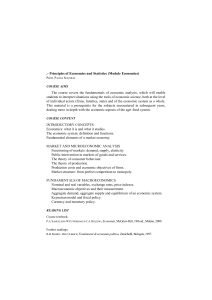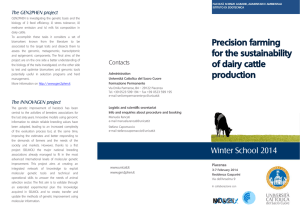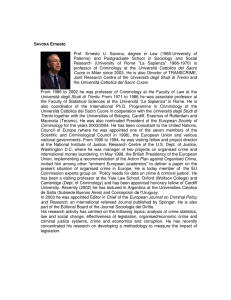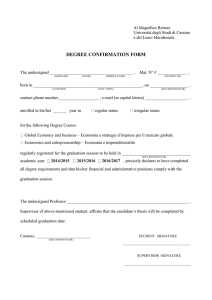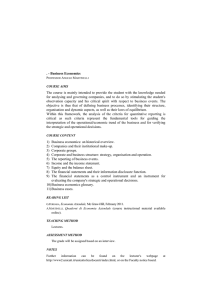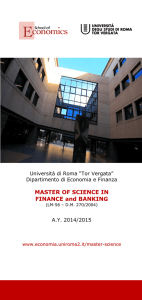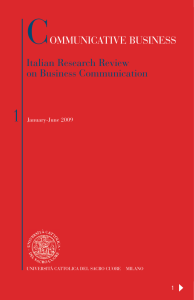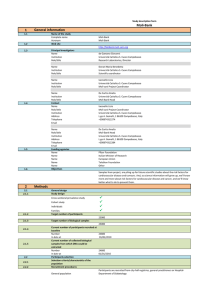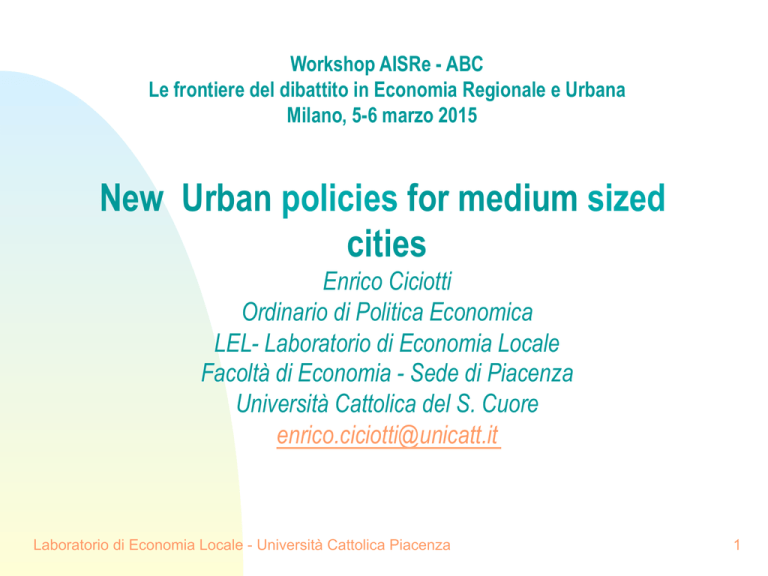
Workshop AISRe - ABC
Le frontiere del dibattito in Economia Regionale e Urbana
Milano, 5-6 marzo 2015
New Urban policies for medium sized
cities
Enrico Ciciotti
Ordinario di Politica Economica
LEL- Laboratorio di Economia Locale
Facoltà di Economia - Sede di Piacenza
Università Cattolica del S. Cuore
[email protected]
Laboratorio di Economia Locale - Università Cattolica Piacenza
1
Summary
1.
2.
3.
4.
Why a new policy for the cities ?
The regulatory environment
The definition of medium sized cities
The model proposed
Laboratorio di Economia Locale - Università Cattolica Piacenza
2
1-Why a new policy for the cities ?
1. Structural aspects
1. The cities: where are concentrated the majority of
population, consumers, human capital , culture,
physical and immaterial infrastructures, productive
capacities and the related problems and
opportunities;
2. Cyclical Aspects
1. Deficit in public and private investments
2. Deficit in internal demand
Laboratorio di Economia Locale - Università Cattolica Piacenza
3
2-The regulatory environment
l
Methods
and objectives for effective use of EU funds
2014-2020", recognizes the strategic option "city" and
incorporates the indications of the European Union in
relation to the assumption, by the city, of a more active role
in the use of these funds, in order to support the
development of the country. Programming must: "consider
the city as a functional city ; by distinguishing between large
cities / metropolitan areas, medium-sized cities and small
towns systems; focusing on the Network of large
metropolitan cities to strengthen Europe's competitiveness”
Laboratorio di Economia Locale - Università Cattolica Piacenza
4
2-The regulatory environment (2)
Methods and content on the priorities in the field of
Urban Agenda", presented by the Interministerial
Committee for Urban Policy (CIPU), establish that: ”It is
important to strengthen the role of metropolitan cities as
protagonists of territorial policies. The potential for social
and economic innovation and experimentation
metropolitan cities was largely underused in the past two
programming cycles of community resources. (...) In
particular, it gained the conviction that it is appropriate to
consider a national program for metropolitan cities for
2014-2020 and that with the same objectives are
provided programs for medium-sized cities in the context
of POR (Regional Operative Programs )
Laboratorio di Economia Locale - Università Cattolica Piacenza
5
2-The regulatory environment (3)
The city of the future, challenges, ideas, anticipations
", Directorate-General for Regional Policy and Urban
European Commission - October 2011: "The prosperous
and dynamic medium (small)-sized cities may play an
important role not only for the welfare of the inhabitants,
but also of the surrounding rural populations. They serve
to prevent the depopulation of rural areas and the exodus
to the cities and to promote a balanced development of
the territory “
Laboratorio di Economia Locale - Università Cattolica Piacenza
6
3-The definition of medium-sized cities in Italy- according
to the Partnership Agreement 2014-2020
STEP 1→ 4 CRITERIA :
1. Population> 45,000 inhabitants
2. No capitals of metropolitan cities
3. Centers of service supply - DPS 2013 (simultaneous location of any
secondary school; locations of hospitals with Emergency Departments
and Acceptance Level I and presence of railway stations Platinum, Gold
or Silver)
4. Economic Specialization (municipalities specialized in the secondary
or tertiary sectors)
STEP 2 → CRITERIA :
1. Administrative functions (regional capitals and provincial capitals
>45,000 inhabitants not included in the first phase + City of Aosta)
2. No capitals of metropolitan cities (criterion also
in the first stage)
Total = 105 medium-sized cities
Laboratorio di Economia Locale - Università Cattolica Piacenza
7
Partnership Agreement 2014-2020
Is the document prepared by a Member State in
cooperation with the institutions of central and
local level and the economic and social partners,
defining strategies, methods and spending
priorities.
It is approved by the European Commission
following the negotiations with the Member State
(for Italy approved the 29 of october 2014)
Source of the definition :"L’Italia delle città medie" – 4°QUADERNO
DELLA COLLANA "I COMUNI" DEL CENTRO DOCUMENTAZIONE
E STUDI ANCI-IFEL http://www.fondazioneifel.it/formazione/
quaderni-dei-comuni/item/download/
867_4f2daf90399046552b8cee731df9bef3
Laboratorio di Economia Locale - Università Cattolica Piacenza
8
Laboratorio di Economia Locale - Università Cattolica Piacenza
9
Medium sized cities included in Partnership
Agreement 2014
Medium
Capital of
Metropolitan
sized cities metropolitan cities
cities
Italy
N° of Municipalities
105
10
1.009
8.057
% of Municipalities
1,3
0,1
12,5
100,0
Population 2014
9.516.435
8.209.328
18.478.763
60.782.668
% of population
15,7
13,5
30,4
100,0
Density (Pop/kmq)
579
2.760
551
201
Laboratorio di Economia Locale - Università Cattolica Piacenza
10
To be noticed that in the programming cycle 2014-2020:
• Metropolitan Cities, are supported by the interventions
of the National Operational Programme (PON)
"metropolitan cities" and by the Urban Agenda trhough
Regional
Programs and other National Operational
Programs;
• Small Municipalities (up to 5,000 inhabitants), are of the
main recipients (84%) the National Strategy for Inner
Areas;
• Medium-sized cities are not in receipt of any PON,
National Strategy or dedicated axis. On the other hand
according to the AdP Italy (Partnership Agreement)
medium-sized cities are included in the urban strategy
2014-2020.
In these territories therefore the urban
agenda is only applied through the Regional Operational
Programmes (POR)
Laboratorio di Economia Locale - Università Cattolica Piacenza
11
Medium-sized cities in the Regional Programs
(POR) 2014-2020
N° Regions
N° Medium-sized
cities
Euro (Milions)
Medium-sized
cities
12
59
1,300
Urban
development
4
--
272
Altre
2
--
---
Laboratorio di Economia Locale - Università Cattolica Piacenza
12
4-A model for a new urban policy
1.
2.
3.
4.
5.
Theoretical and empirical references
The scheme
Innovative sectors and project integration
Demand and supply integration
Production chain integration
Laboratorio di Economia Locale - Università Cattolica Piacenza
13
4.1-Theoretical and empirical references
1. Incubator Hypothesis (Leone, Struick, 1976; Ciciotti, 1984)
2. Development Diffusion: filtering down theory (Berry, 1972;
Thompson, 1968) and growth pole theory( Boudeville
(1972),
3. Innovation oriented regional policy (Ciciotti,!977)
4. Cities as milieu innovateur (Camagni, 1999),
5. Network of synergy and complementarity (Camagni, 1993;
Dematteis, 1985),
6. Structural and strategic competition (Ciciotti, Perulli, 1991).
Laboratorio di Economia Locale - Università Cattolica Piacenza
14
4.1…and related implication
1. The close link between the city and innovation, resulting from a series of
factors related mainly to the economies of urbanization and localization,
the reduction of transaction costs and uncertainty in the presence of tacit
and explicit knowledge that facilitate collective learning processes, but also
thanks to the availability of physical spaces that play a role of incubators
for innovative enterprises.
2. The process of diffusion of innovations and economic development, which
takes place at the micro-scale territorial, between the center and the
periphery of the metropolitan areas, as well as at the macro scale
territorial, thanks to the filtering process between the different nodes of the
urban structure.
3. The importance of the relations of cooperation and synergy that can be
established between the cities given the overcoming of the hierarchical
model of urban structure in favor of network approaches.
4. The role played by both structural and voluntary components in the
competition that characterizes the post-industrial city in the age of
globalization and the related consequences for urban policies.
Laboratorio di Economia Locale - Università Cattolica Piacenza
15
Laboratorio di Economia Locale - Università Cattolica Piacenza
16
4.3-Sector , innovative activities and inintegrated
projects of development
1. Emerging and innovative sectors to respond to the new needs of the
citizen-consumers and to improve the quality of life, the external
economies , the competitiveness of urban areas and producing a
new urban economic base (see also Agenda Urbana).
2. Sectors with strong domestic demand, but for which is even
possible to gain competitive advantages on an international scale,
as there is a relevant market at least at EU level (eg. : enhancement
of historic centers, securing of ancient buildings, cultural and
creative industries, tourism , and urban regeneration in general)
3. Sectors for which an integrated design is demanded, giving the
proper emphasis in the evaluation of projects of urban policies to
intangible items such as place marketing, promotion,
communication, and management aspects of the initiatives.
Laboratorio di Economia Locale - Università Cattolica Piacenza
17
4.4-Demand and supply integration
Virtuous circle that, starting from the demandsupply of the innovations necessary to the new
needs of citizens, evolves along the path:
improved quality of life- greater external
economies - greater urban competitivenessattraction of external investments - development of
new sectors (new industrial economy)
Laboratorio di Economia Locale - Università Cattolica Piacenza
18
4.5-Production chain integration and
new industrial economy
1. Networking the city so that they exchange good practices and
establish networks of cooperation and synergy;
2. Exploiting the natural process of diffusion of innovations through
the urban framework;
3. Exploiting economies of scale in production and use of new
products and services developed for individual urban systems;
4. Strategies and specific actions devoted to the emergence and
consolidation of appropriate cluster: sectors for which the demand
by the city is stronger in terms of quantity, technological innovation
and export potential (. St.Geit Venz / Carinthia )
5. In general, we can imagine a new industrial economy focused on
”driving ideas/ leading markets" covering several production chains.
Laboratorio di Economia Locale - Università Cattolica Piacenza
19
Bibliography
Baravelli,M. Bellandi, M. Cappellin R. Ciciotti,E.Marelli,E.(2015):
“Crescita Investimenti e Territorio”
www.economia.uniroma2.it/dedi/ebook-politiche-industriali/
Berry,B. (1972), Hierarchical Diffusion: the Basis of Development of
Filtering and Spread in a system of Growth Centers, in Hansen,
N.M. (ed), Growth Centers in Regional Economic
Development ,New York: The Free Press.
Boudeville, J.(1972), Amenagement du teritoire et polarization, Ed.
Genin et Ed. d’Organisation, Paris
Camagni,R., (1993),From city Hierarchy to City Network:
Reflections about an Emerging Paradigm, in Lakshmanan, T.R.,Nijkamp P., (eds.), Structure and Change in the Space Economy,
Berlin, Springer Verlag.
Laboratorio di Economia Locale - Università Cattolica Piacenza
20
Ciciotti, E.(1984), L’ipotesi dell’incubatrice rivisitata, in Rivista
Internazionale di Scienze Sociali,2-3
Ciciotti, E. – Perulli,P.(1991), La competizione della città
europea, in La costruzione della città europea negli '80, Credito
fondiario, Roma,
Dematteis,G. (1985),Contro-urbanizzazione e strutture urbane
reticolari, in Bianchi,G.- Magnani,I. (eds),Sviluppo
multiregionale :teorie, metodi, problemi, Angeli Milano.
Leone, R.A.-Struick,R.(1976), The Incubator Hypothesis:
Evidence from Five SMSAS, in Review of Economic Studies,
21-1
Thompson,W.(1968),Internal and External Factors in the
Development of Urban Economies , in Perloff,H.-Wingo,L.
(eds.), Issues in Urban Economics, John Hopkins Press ,
Washington.
Laboratorio di Economia Locale - Università Cattolica Piacenza
21





